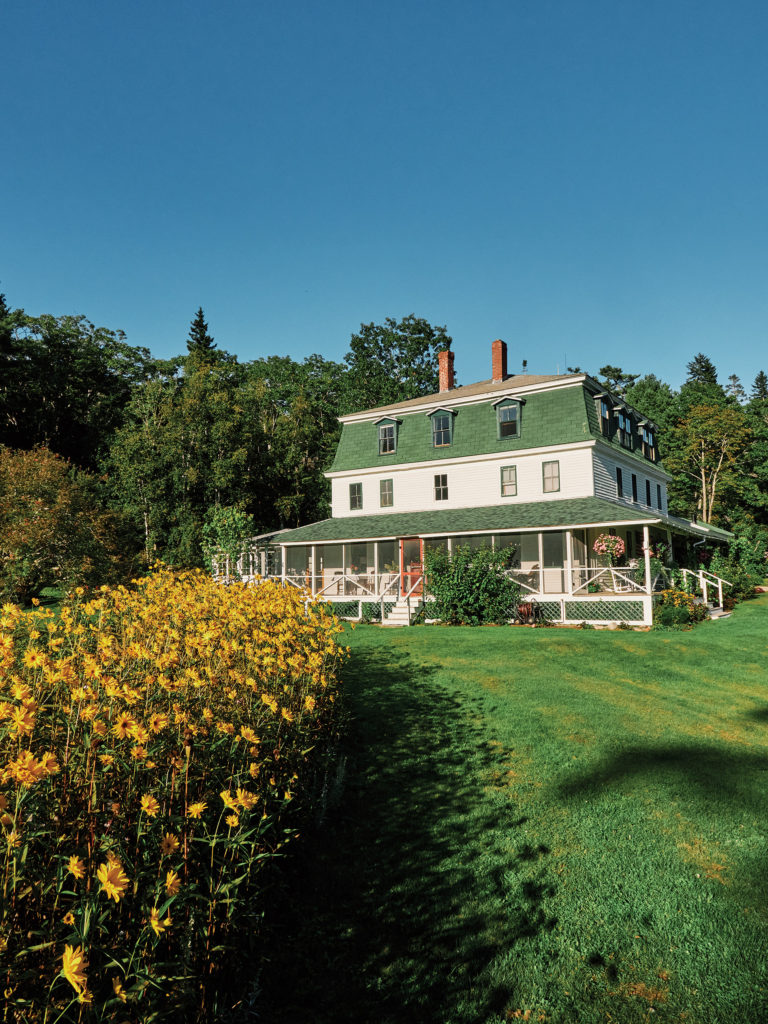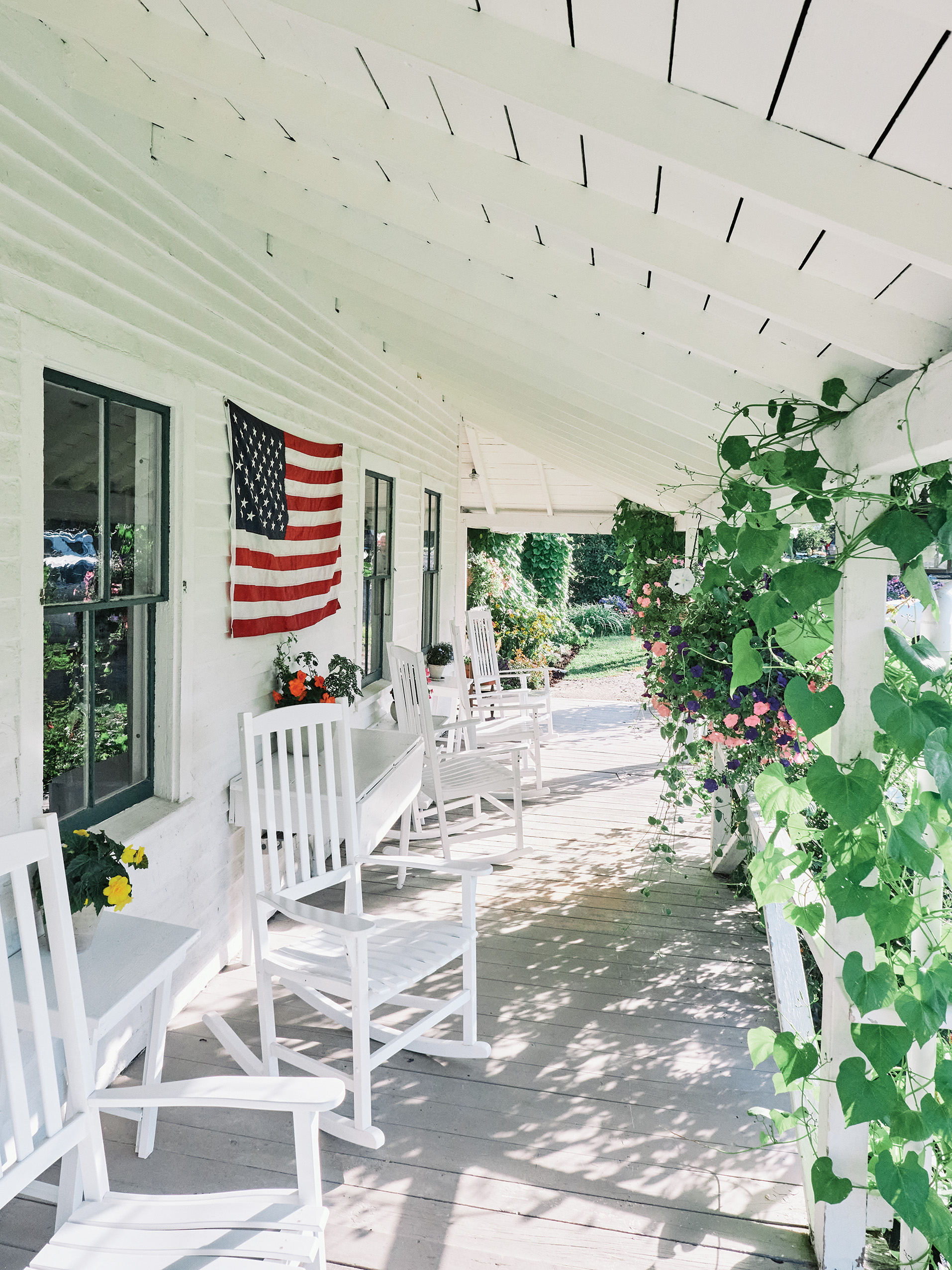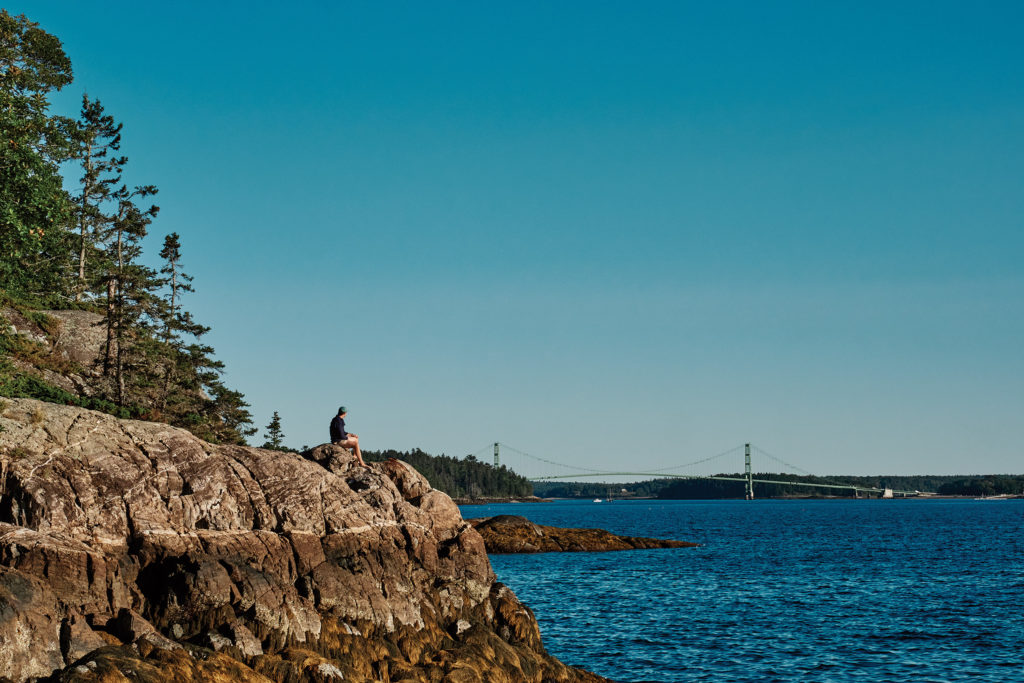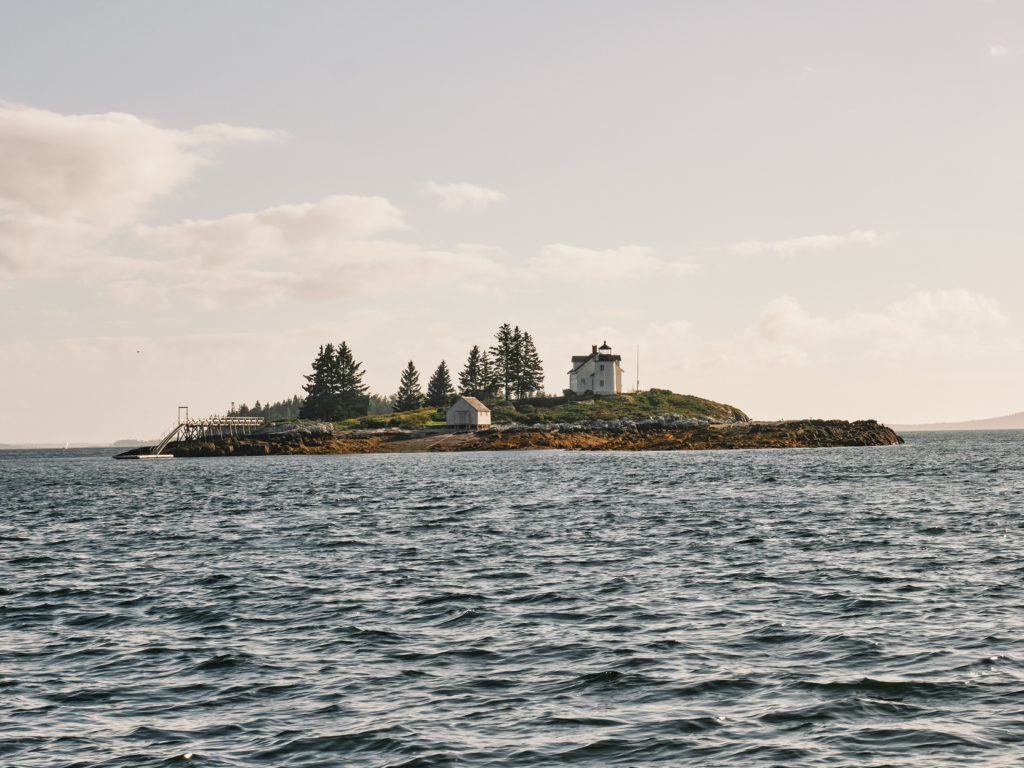The Retro-Cool Coastal Maine Inn to Visit This Summer
Tucked-away beaches, lawn games, and overlook trails on the shores of Eggemoggin Reach on the Blue Hill Peninsula are the realm of the historic Oakland House Seaside Inn and Cottages, now refreshed with new life and style.

The Retro-Cool Coastal Maine Inn to Visit This Summer
Tucked-away beaches, lawn games, and overlook trails on the shores of Eggemoggin Reach on the Blue Hill Peninsula are the realm of the historic Oakland House Seaside Inn and Cottages, now refreshed with new life and style.
by Sandy Lang
Photography by Peter Frank Edwards
Issue: June 2022
Tetherball—that’s what they’re playing the first time we see one of the other couples staying here at the Oakland House Seaside Inn. A volleyball net is nearby, with thick, green, untrammeled grass below. Yellow wildflowers are growing hedge-high in an island-like mass beside the tall, white painted inn with a green mansard roof. The breeze has the fresh saltiness of ocean-facing places. After all, “the Reach”—Eggemoggin Reach, the wide and deep channel that flows between Penobscot Bay and Blue Hill Bay—is just through the trees on the sloping property.
Altogether, it’s a storybook scene, practically cinematic.
“This place is a nice secret,” says the 30-something woman from the tetherball game when we later meet on the inn’s wide porch lined with rocking chairs and hanging baskets of flowers. “My husband keeps asking me how I found it.” She explains that they’re staying in one of the inn’s cottages, and she points toward its location on an unpaved lane leading to the shore. “Inside, it’s got this almost Wes Anderson design that’s good for us—interestingly weird in the best way.”

Eggemoggin Reach from one of the property’s beaches.

“Barnacle” barn at the Oakland House.

Preserve; the trail network can be accessed directly
from the Oakland House Seaside Inn.
I see what she means. The aesthetic at the 133-year-old inn, situated on over 60 acres along the shore, has elements of symmetry, interesting objects and lines, and a lack of crowds so that you have time and space to notice the scenery and character.
Another guest follows a path to the shore at dawn to swim at one of the two beaches on the property. I notice her early the next day, stepping swiftly as part of her daily routine. I’m traveling with photographer Peter Frank Edwards, and after a breakfast that includes a wide bowl of oatmeal awash in blueberries and maple syrup, we make plans to get moving too. Our idea is to follow a trail that leads from the inn up to Lookout Rock and a seaside view from its 244-foot elevation. It is part of a preserve protected by the Maine Coast Heritage Trust. But first, we stop to peek inside one of the historic cottages that open for a few hours between bookings. In an impeccably tidy room with a tall ceiling and log beams that create linear patterns on the stucco walls, two twin beds with matching checkerboard quilts are separated by a table lamp with a shade that’s just slightly, jauntily askew—and I’m charmed.
Innkeepers, They Must
Innkeeper Robin Littlefield smiles knowingly when I relay these observations. “Maine is such a healing place, and most people who come here love the outdoors,” she says. Littlefield notes that the revamped inn has attracted steady interest, even through the pandemic, when they had to scale back on dining room offerings and pause the occasional open mic nights in the Barnacle, a large wooden barn a few dozen yards from the main house. “I don’t know why, but the Brooklyn kids discovered us last summer,” she says. “They just started showing up in pajamas and bare feet. They’d tell us that we’re trending on social media.”
Littlefield is New York City–savvy herself. Earlier in her career she worked in the city’s fashion and magazine world writing for various publications, including W, Women’s Wear Daily, and Condé Nast Traveler. When we meet she’s wearing blue jeans and notes that her daily tasks at the inn in summertime are quite a shift from her Manhattan days, when one of her assignments was “going to socialite parties to report on the fashion, asking what designers people were wearing.”

apple trees and wildflowers.

the porch.
Her husband, Rick Littlefield, is a descendant of eighteenth-century settlers who arrived to claim a land grant made by King George, who distributed land occupied by the Penobscot people to English emigrants. They developed a granite quarry, a wharf, and ice-cutting businesses. By 1889 Rick’s ancestors Emery and Flavilla Herrick had sold some of their land and interest in ships and pivoted to a new enterprise: welcoming guests for seaside holidays. The Herricks added a third floor to the farmhouse and affixed a sign, dubbing the property “Oakland House.” Future generations continued the hospitality.
Now 69, Rick has memories from growing up here, of riding horseback along the shore and diving for scallops that he’d then dredge in flour and fry up. Littlefield cousins operated the inn by the 1970s, and Rick’s father, Frederic Littlefield, helmed the Robin Hood Camp he’d founded decades earlier on an adjoining property along the spring-fed Walker Pond. The summer camp still attracts children from dozens of countries for weeks-long stays each year, and Rick eventually became owner-director himself. So he was close by when in 2017 his cousins put the Oakland House property up for sale.
Immediately, Rick says, he knew that he and Robin should buy it: “This place hits a sweet spot for me.” Many people said the main house was a tear-down, he explains. “But I couldn’t drive by and see the family legacy gone. Everyone had worked so hard for this, from the granite and ice days to Robin Hood to an inn with history.”
These days, Robin coordinates seasonal inn operations with the help of longtime staff and recently led a major renovation to reopen the main house to guests. Rick focuses on his work at Robin Hood, making frequent trips to the United Kingdom and Europe to meet prospective campers and their parents in the off-season.
Easy to Step in

With the windows open and cricket songs humming, I sit propped up on the cloud-like comforter and bed pillows in our third-floor suite and jot notes in a personal journal. This feels like a place where writers would steal away, and when I ask Robin she says they often do. (She’s been working on some writing projects herself.) She notes that Oakland House is within about ten miles of the saltwater farm where E.B. White wrote his essays—and she rereads some of his writing each summer.

in one the resort’s cottages.


the Oakland House.

The general hush here is a joy that I keep finding. Just before sunset, Peter Frank and I walk to the beach and see a seal bobbing in the water, facing Pumpkin Island in the sunset’s path. Two kayakers are in silhouette against the last bits of golden light on the water, and a distant lobster boat zooms across the scene, closer to Little Deer Isle than to us. The granite ledge here has rounded edges and distinctly amber and charcoal shades tumbled smooth, with deep green seaweed on the portions closer to the water. We don’t want to leave the shore. Signs for the “Swim Beach” path we took to get here from the main house direct guests through a patch of woods to this private stretch of beach that rises to a high bluff at one end. I’m drawn to the crystal-clear water in the shallow edges of Eggemoggin and walk in almost to my knees, just to step for a minute on the smooth rocks and sand.
Boat Rides, Birds, and a Pizza Garden

On our second day at Oakland House, we seek out more lake and sea. In the morning, Registered Maine Guide Dan Ryan, who assists at Robin Hood Camp, helps us gear up with life jackets and canoe paddles. Peter Frank and I take a canoe out on Walker Pond and paddle along the shore, looking up at the tall rise of Caterpillar Hill on Route 15 in Sedgwick, where cars stop for far-reaching views (and mobile phone reception). Traffic on the water, though, is nil this weekday—the camp’s not in session. Instead we see avian life, including kingfishers, ospreys, cormorants, chickadees, sparrows, and a loon that suddenly pops up from its underwater swimming to give us a good look before ducking below the surface again.


who arrived to claim a King George land grant.


In the afternoon, we go down to the saltwater dock to meet with the Littlefields, who have offered to take us out on their roomy Boston Whaler. Looking back toward the Oakland House shoreline, it’s easy to see the advantageous positioning of the inn, which is perched high. In a sailing jacket and cap, Rick captains the boat as he regales us with local lore. He offers accounts of a long-ago lighthouse keeper with a peg leg; the winter of such a hard freeze that “people walked across the bay to Camden”; a whale that’s been seen in the Reach in recent years; and discoveries of historic, unexploded cannonballs lodged in the shore.

We’re still thinking of his stories as Peter Frank and I drive out that evening about seven miles to another farmhouse, barn, and gardens. It’s pizza night at Tinder Hearth, a wood-fired bakery in Brooksville. At the check-in table out back, we order a mozzarella and pecorino cheese pizza, salads of local lettuces, and draft beers (from Oxbow and Orono Brewing companies), then find an open table near a row of cornstalks. Families with young children fill some tables; wine is poured at others. It’s a sweater-cool evening, and this is where we’ll dine, outside in Brooksville at the edge of a garden of tomatoes, vegetables, and herbs, with tidewater near—the town landing is about a mile away. Every minute or two, a tree laden with ripe apples drops one or two, soft thuds on soft ground.
Again, I muse that the scene could be illustrated in a storybook or a movie. I’m getting comfortable here. Tomorrow morning at the inn, I just may slip casually downstairs for another lovely breakfast, still in my pajamas.
An Eggemoggin Stay
Oakland House is located on the Blue Hill Peninsula, about 2.5 miles from the Deer Isle Bridge and along a stretch on Eggemoggin Reach known as Herricks Landing. For guests, exploring the Brooksville area may include the nearby towns and villages of Sedgwick, Brooklin, and Deer Isle—all within ten miles.
Oakland House Seaside Inn + Cottages
435 Herrick Rd., Brooksville
oaklandhouse.com
Open mid-May to mid-October with guest rooms, suites, and cottages. Offers swimming, hiking, boating, and full breakfasts.
Tinder Hearth
1452 Coastal Rd., Brooksville
tinderhearth.com
Wood-fired bakery with farm dinners.
LDI Lobster
202 Little Deer Isle Rd., Little Deer Isle
ldilobster.com
Seasonal takeout and ice cream shack with picnic tables on Eggemoggin Reach.
Bucks Harbor Market
6 Cornfield Hill Rd., Brooksville
facebook.com/brooksvilleme/
Small grocery with prepared foods, beer, and wine.
Lookout Rock Preserve
445 Herrick Rd., Brooksville
mcht.org/preserve/lookout-rock
Trail network to a scenic overlook with a parking lot and kiosk directly across from Robin Hood Camp.
Cooper Farm at Caterpillar Hill
Route 15, Sedgwick
bluehillheritagetrust.org
Looping trails at the Caterpillar Hill Scenic Turnout above Walker Pond, with parking off the unpaved Cooper Farm Road.
Read More:
- Branching Out

- 48 Hours in Cape Elizabeth, South Portland + Scarborough

- 4 Unique Winter Weekends

- Brunswick in 48 Hours


